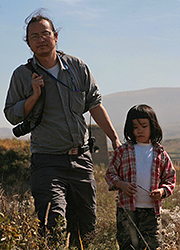小站色坛NG学堂(2):《印度尼西亚——生存在危险之地》
 |
长城小站是由志愿者支持的公益性网站,无固定经济来源。2012年小站台历是由各方网友赞助图片、设计、印刷精心制作的纪念品,用于小站运营经费筹款。
欢迎您购买小站台历,支持长城小站与小站博客的发展。 |
|
《印度尼西亚——生存在危险之地》
专题网址
题图:

文:Tracy Dahlby 摄影:Alexandra Boulat
Zealot-warriors and regional separatists force the question: Can this far-flung nation hold together?
Get a taste of what awaits you in print from this compelling excerpt.
“You can’t run a modern country like Indonesia by tradition,” said His Highness Hamengku Buwono X, the 53-year-old sultan of Yogyakarta, when I caught up with him at a fish farm in the ancient Javanese capital. The sultan, who serves as local governor, was calmly puffing on a cigar, advising rapt villagers on how to use the Internet to be competitive in the global marketplace. A man from one of the country’s oldest ruling families (whose name means “he who carries the universe on his lap”), he is considered one of its most progressive leaders.
“If decisions are based on the Javanese way,” said the sultan, “people outside Java call it injustice.” Furthering Jakarta’s tentative efforts to decentralize political power and share the country’s wealth more evenly, he said, was the best way to preserve the union.
*******
Others were convinced that moving forward meant recapturing the past, even if it led to bloodshed. In West Kalimantan Province, on Borneo’s western shoulder, Dayak tribesmen had recently battled settlers from Madura, an austere little island east of Java, prompting reports of hundreds of deaths, some “spectacular beheadings,” and Dayak magicians invoking warrior spirits to spook the police and army.
So it was with trepidation that I drove through the port of Pontianak, its rivers gleaming darkly in the moonlight, to the deserted edge of town. There I climbed a creaky staircase to meet local Dayak chieftains, who had gathered to make plans for an independent republic. But when the door swung back, I found a light-filled room with a conference table and a cluster of smiling, distinguished-looking men. Dressed in batik shirts and slacks, they glided across the floor to shake my hand.
I asked why they wanted independence. “I used to love Indonesia very much, but everybody wants to separate now!” a young activist blurted out before the chiefs could say a word.
Reddening with frustration, he ticked off local grievances: Big farming and timber interests had driven the Dayak, semi-nomadic farmers, from traditional haunts along Borneo’s complex river network and into squalid towns. There the Dayak, now mostly Christian, had encountered enterprising, hard-nosed Muslim Madurese, who ran the shops and worked in the factories. The Dayak were chagrined by Madurese custom that allows men to carry the carok, a big curved knife, in public—a violation of Dayak adat, or customary law.
“They show they are the brave men,” said the young man. “They think the Dayak are cowards!”
One of the chiefs lifted a bushy brow and silenced him with a glance that might have paralyzed a small animal, then spoke up softly. The Dayak felt very Indonesian and didn’t want to leave the union, he said. “But there is rampant injustice against our community”—in jobs, education, and particularly in sharing the proceeds from the exploitation of Borneo’s natural resources. Unless Jakarta offered a solid plan to even the score, the Dayak had no choice but to go their own way.
火箭人于
2004-12-20 22:25:35 发表在分类:
摄影 中
(49378次点击) | 标签:



![Validate my RSS feed [Valid RSS]](valid-rss.png)
